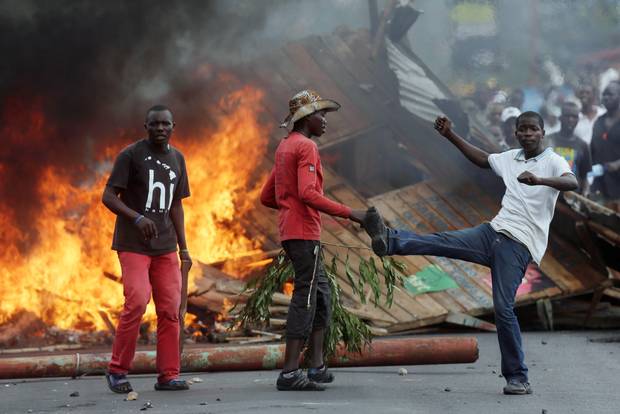Burundian President Pierre Nkurunziza arrived back in the country Thursday, a day after a coup was declared while he was in Tanzania for regional talks, his office said.
“President Pierre Nkurunziza is now in Burundi,” his senior communications advisor Willy Nyamitwe told AFP. “That’s all we can say for the now because of security reasons.”
Burundi is sliding back towards all-out conflict after a military coup and fierce fightback from forces loyal to President Pierre Nkurunziza.

The capital, Bujumbura, was the scene of fierce fighting as loyalist forces battled to retain control of key institutions – particularly the state television and radio complex – from pro-coup forces.
By nightfall, it remained unclear who, if anyone, was in charge. The streets were all but deserted.
Analysts warned that the longer the impasse continues, the greater the likelihood that the country will be plunged into a civil war, potentially drawing in neighbouring countries, such as Rwanda.
Burundi’s ethnically-charged civil war, in which 300,000 Burundians lost their lives and which helped spark the 1994 genocide of Tutsis in Rwanda, ended in 2005 and remains a bitter memory.
Mr Nkurunziza, who triggered the current show-down with his bid for a third presidential term in breach of the constitution, remained barred from returning to the central African nation after the coup leaders closed the borders while he was in Tanzania for an emergency summit to discuss the crisis.
But unconfirmed reports indicated loyalist troops later retook the airport, paving the way for his return.
While his exact whereabouts remained a secret, he was able to relay a message via national radio denouncing the coup and offering forgiveness to those soldiers who surrendered, only for the station to go off the air a short while later. The station, a potent symbol of power in the country, soon resumed broadcasts, and insisted it was still in the hands of troops loyal to the president. “We had stopped broadcasting for several minutes because there was heavy fighting,” the broadcast said. “The fighting is over and we are resuming our broadcast.”
A spokesman for General Godefroide Niyombare, the army officer who launched the coup on Wednesday in the president’s absence and who has not been heard from since, insisted that the capital remained in the hands of General Niyombare’s supporters. “We control virtually the entire city. The soldiers who are being deployed are on our side,” Venon Ndabaneze told Agence France Presse.
The military, split now into two rival factions, has been viewed as an impartial observer in the two weeks of demonstrations that followed the president’s decision to stand, and news of the coup was initially greeted with jubilation by many in the capital. At least 15 people have been killed in the protests. The constitution limits a president to two terms, but Mr Nkurunziza, a Hutu and former rebel leader, has argued that his first term does not count because he was chosen by parliament, not the people. The US State Department said it still recognised Mr Nkurunziza as the president.

But critics view his decision to stand again as a dismissal of the Arusha peace agreement that served as a basis for the 2005 constitution, and enshrined equal rights for the minority Tutsi population, who had dominated government prior to the conflict. “If this conflict goes on for any longer, it [could] descend into a scenario of all out war between two parties who are very well armed,” said Yolande Bouka, an analyst at the Institute for Security Studies. “The whole country could be swallowed by civil war.
Despite fears in some quarters that the conflict could play out along ethnic lines, the battle for power remains a purely political one at present. General Niyombare, a Hutu, hails from the president’s innermost circle. He rose through the ranks to become the army chief of staff, served as Burundi’s ambassador to Kenya, and was appointed head of intelligence in December, putting him at the heart of a regime that ruled by force.
He was abruptly sacked in February after writing to the president advising him not to seek a third term, fearing, like others in the military, that it would lead to civil disturbance. Mr Nkurunziza, a born-again Christian who believes he has a divine calling to lead, is treading a well-worn path in Africa. In four African countries, leaders have clung onto power for more than 30 years, and President Yoweri Museveni in nearby Uganda this year celebrated his 29th year in office.
It was perhaps unsurprising then that African nations roundly condemned the coup. “East African leaders are determined to find a lasting solution to Burundi’s crisis,” Tanzanian Foreign Minister Bernard Membe said. “Africa does not want the leadership of any country to be assumed by the barrel of a gun.”
But if Mr Nkurunziza does not return to Burundi soon, it will be hard for him to regain control as the legitimate leader of the country, analysts said, raising the prospect of a protracted power struggle.
African coups: Failed takeover bids
The Gambia
An attempted coup to topple the strongman President, Yahya Jammeh, on Boxing Day failed when plotters thought the President’s guard wouldn’t return fire. Most of the assailants died.
Mr Jammeh came to power by overthrowing the country’s first President, in 1994.
Ivory Coast
Has seen an number of coup attempts. In 2012 authorities foiled a plot to overthrow the government organised by supporters of the former President Laurent Gbagbo.
The coup plotters were linked to Liberian mercenaries and Ivorian militias. Mr Gbagbo will go on trial in November over a violent reaction to his refusing to stand down.
FRENCH VERSION


